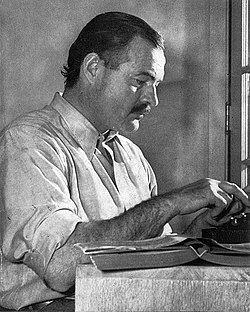Ernest Hemingway Quote
It was baking hot in the square when we came out after lunch with our bags and the rod-case to go to Burguete. People were on top of the bus, and others were climbing up a ladder. Bill went up and Robert sat beside Bill to save a place for me, and I went back in the hotel to get a couple of bottles of wine to take with us. When I came out the bus was crowded. Men and women were sitting on all the baggage and boxes on top, and the women all had their fans going in the sun. It certainly was hot. Robert climbed down and fitted into the place he had saved on the one wooden seat that ran across the top. Robert Cohn stood in the shade of the arcade waiting for us to start. A Basque with a big leather wine-bag in his lap lay across the top of the bus in front of our seat, leaning back against our legs. He offered the wine-skin to Bill and to me, and when I tipped it up to drink he imitated the sound of a klaxon motor-horn so well and so suddenly that spilled some of the wine, and everybody laughed. He apologized and made me take another drink. He made the klaxon again a little later, and it fooled me the second time. He was very good at it. The Basques liked it. The man next to Bill was talking to him in Spanish and Bill was not getting it, so he offered the man one of the bottles of wine. The man waved it away. He said it was too hot and he had drunk too much at lunch. When Bill offered the bottle the second time he took a long drink, and then the bottle went all over that part of the bus. Every one took a drink very politely, and then they made us cork it up and put it away. They all wanted us to drink from their leather wine-bottles. They were peasants going up into the hills.
It was baking hot in the square when we came out after lunch with our bags and the rod-case to go to Burguete. People were on top of the bus, and others were climbing up a ladder. Bill went up and Robert sat beside Bill to save a place for me, and I went back in the hotel to get a couple of bottles of wine to take with us. When I came out the bus was crowded. Men and women were sitting on all the baggage and boxes on top, and the women all had their fans going in the sun. It certainly was hot. Robert climbed down and fitted into the place he had saved on the one wooden seat that ran across the top. Robert Cohn stood in the shade of the arcade waiting for us to start. A Basque with a big leather wine-bag in his lap lay across the top of the bus in front of our seat, leaning back against our legs. He offered the wine-skin to Bill and to me, and when I tipped it up to drink he imitated the sound of a klaxon motor-horn so well and so suddenly that spilled some of the wine, and everybody laughed. He apologized and made me take another drink. He made the klaxon again a little later, and it fooled me the second time. He was very good at it. The Basques liked it. The man next to Bill was talking to him in Spanish and Bill was not getting it, so he offered the man one of the bottles of wine. The man waved it away. He said it was too hot and he had drunk too much at lunch. When Bill offered the bottle the second time he took a long drink, and then the bottle went all over that part of the bus. Every one took a drink very politely, and then they made us cork it up and put it away. They all wanted us to drink from their leather wine-bottles. They were peasants going up into the hills.
Related Quotes
About Ernest Hemingway
Hemingway was raised in Oak Park, Illinois, a suburb of Chicago. After high school, he spent six months as a reporter for The Kansas City Star before enlisting in the Red Cross. He served as an ambulance driver on the Italian Front in World War I and was seriously wounded by shrapnel in 1918. In 1921, Hemingway moved to Paris, where he worked as a foreign correspondent for the Toronto Star and was influenced by the modernist writers and artists of the "Lost Generation" expatriate community. His debut novel, The Sun Also Rises, was published in 1926. In 1928, Hemingway returned to the U.S., where he settled in Key West, Florida. His experiences during the war supplied material for his 1929 novel A Farewell to Arms.
In 1937, Hemingway went to Spain to cover the Spanish Civil War, which formed the basis for his 1940 novel For Whom the Bell Tolls, written in Havana, Cuba. During World War II, Hemingway was present with Allied troops as a journalist at the Normandy landings and the liberation of Paris. In 1952, his novel The Old Man and the Sea was published to considerable acclaim, and won the Pulitzer Prize for Fiction. On a 1954 trip to Africa, Hemingway was seriously injured in two successive plane crashes, leaving him in pain and ill health for much of the rest of his life. He committed suicide at his house in Ketchum, Idaho, in 1961.
